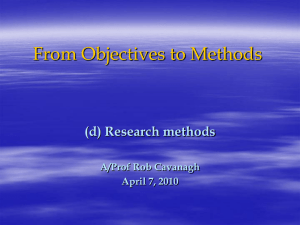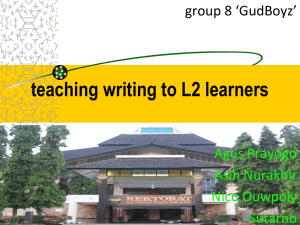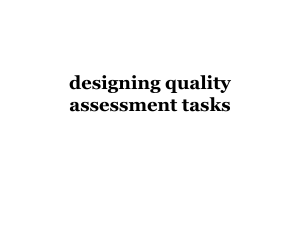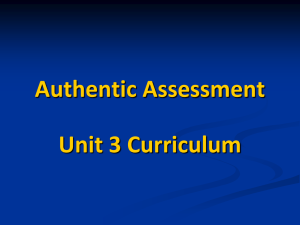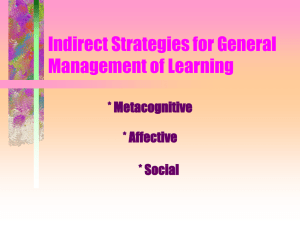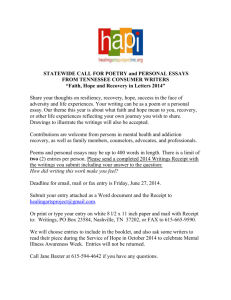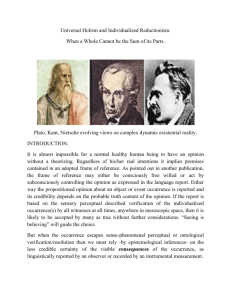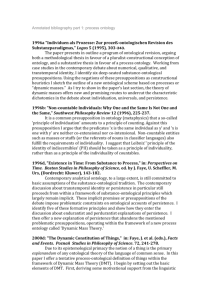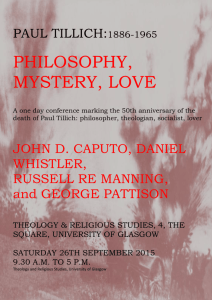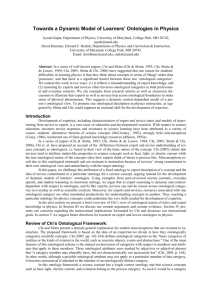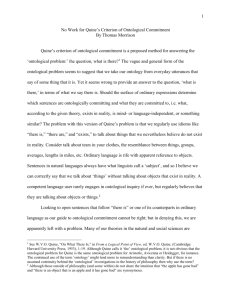jwresponsetopieter
advertisement
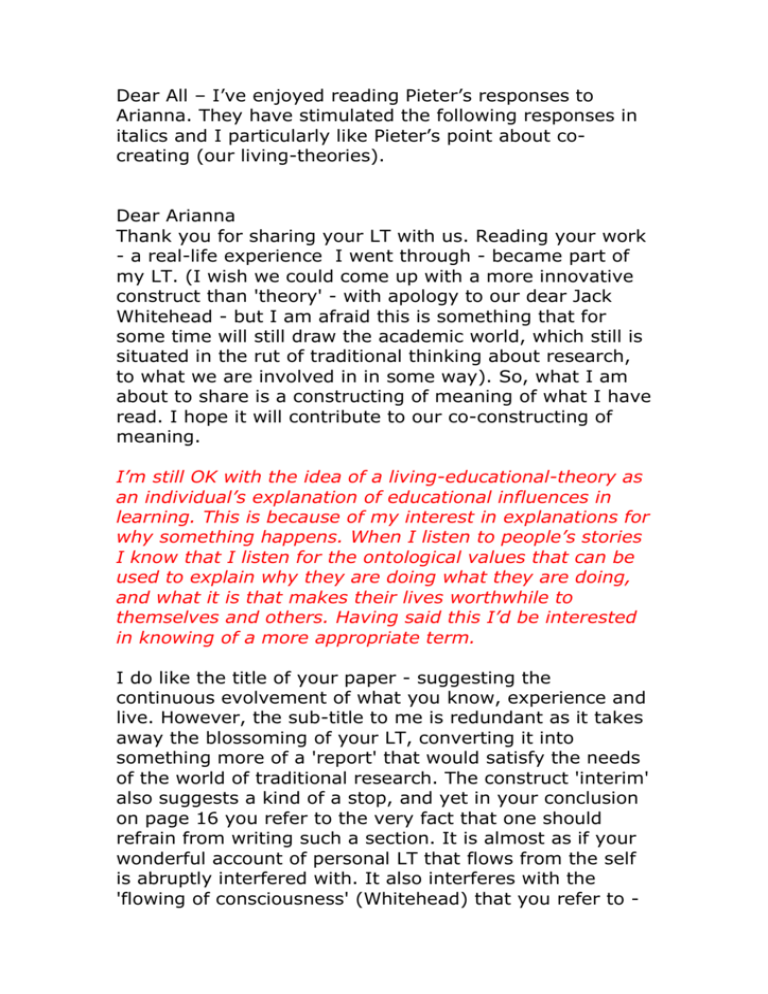
Dear All – I’ve enjoyed reading Pieter’s responses to Arianna. They have stimulated the following responses in italics and I particularly like Pieter’s point about cocreating (our living-theories). Dear Arianna Thank you for sharing your LT with us. Reading your work - a real-life experience I went through - became part of my LT. (I wish we could come up with a more innovative construct than 'theory' - with apology to our dear Jack Whitehead - but I am afraid this is something that for some time will still draw the academic world, which still is situated in the rut of traditional thinking about research, to what we are involved in in some way). So, what I am about to share is a constructing of meaning of what I have read. I hope it will contribute to our co-constructing of meaning. I’m still OK with the idea of a living-educational-theory as an individual’s explanation of educational influences in learning. This is because of my interest in explanations for why something happens. When I listen to people’s stories I know that I listen for the ontological values that can be used to explain why they are doing what they are doing, and what it is that makes their lives worthwhile to themselves and others. Having said this I’d be interested in knowing of a more appropriate term. I do like the title of your paper - suggesting the continuous evolvement of what you know, experience and live. However, the sub-title to me is redundant as it takes away the blossoming of your LT, converting it into something more of a 'report' that would satisfy the needs of the world of traditional research. The construct 'interim' also suggests a kind of a stop, and yet in your conclusion on page 16 you refer to the very fact that one should refrain from writing such a section. It is almost as if your wonderful account of personal LT that flows from the self is abruptly interfered with. It also interferes with the 'flowing of consciousness' (Whitehead) that you refer to - in this case your flowing of consciousness. On page 5 you write: this is '...theory of my life'. Yes, it is ever-flowing and written as we go ... In the introductory section you refer to metacognitive skills. I was wondering if this should not be explained in some way: is it not rather to do with strategies? What would be the differences? Should it not rather be 'metaliving' skills/strategies? This is the first time I have heard the term ‘metaliving’ skills/strategies, and I like it. Does it form part of your epistemological grounding of your study? Would you consider constructivism as part of this - as you indicate on page 10 that a space is created (constructed)? To me 'cognitive' is restricting. So is 'dialectic' to which you often refer. I know what you mean, Pieter, about the restricting nature of cognitive and dialectic. They do have limitations but I continue to use them with Richard Peter’s point when he wrote about extending one’s cognitive range and concern as part of one’s educational development. I also continue to be influenced by dialectics, with its nucleus of contradiction. I think that both cognitive understandings and dialectical understandings can include useful insights in the generation of one’s own living-educational-theory. I’ve explained how this can be done in a paper with Alan Rayner at: http://www.actionresearch.net/writings/jack/arjwdialtoInc l061109.pdf You do refer to 'emotional-self' and 'rational-self'. But this is only part of who we are. You might like to include the notion of whole brain thinking (Herrmann) as you yourself refer to the importance of holistic development (development towards a holistic self, page 7); and on age 10 holistic development of individual emotional, psychological and spiritual evolution. How do we claim that that LT is holistic/whole/all inclusive of who we are? I am thinking of a construct such as 'whole brain living theory'. Herrmann refers to the intellectual self, safekeeping self, emotional self and experimental self. I understand the desirability of a feeling of ‘wholeness’ and of the importance of holistic development. However, I’ve tended to see life as a continuing process in which any structure in our thinking can be understood as a transition structure in a continuous process of transformation. I’m thinking of a structure as a selfregulating, transformational whole. I suppose I resist wholeness in the desire to remain open to the possibilities that life itself permits. I got excited when reading on page 6 about 'I'm expressing the energy that flows from me'. This would rather be a description of your ontology instead of what you have as ontology (page 5) which is not that clear. I like very much this point about being as clear as we can about our ontologies. I believe our ontological values are explanatory principles in explanations of our influences. For example in my own writings I acknowledge a debt to Paul Tillich for his insight about the state of being grasped by the power of being itself. Tillich writes as a Protestant Theologian and whilst I have no theistic tendencies I do try to show, with the help of visual data, my embodied, ontological value of the expression of a flow of lifeaffirming energy. Let's refrain from considering our work as being not authentic as what we do is real life and that is by default authentic. What we write and how we write about it is also authentic (as I am doing right now in my second language): a real-life experience in meaning making. In this regard you refer to '... nor genuinely communicative'. Well, what I have read and what I have understood as a narrative account of your LT is authentic! It comes from within! So, let's also refrain from writing 'trying to express', using words such as 'incapacity' (p5) and 'I am not able to express this in words'. I do hold myself accountable for being authentic in the sense of living as fully as I can the ontological values I claim to hold. In focusing on authenticity I’ve been influenced by Theodor Adorno’s ‘The Jargon of Authenticity’ where he criticizes Heidegger for using ‘I’ in a way that remains formal whilst pretending to contain content in itself. I remember in 1971/72 believed that I’d got enquiry learning going with my pupils in my science lessons. A video I made of one of my lessons, showed that I was giving my pupils (however subtly) the questions. I experienced myself as a ‘living contradiction’, hence my interest in dialects. I’m still interested in living as authentically as I can and I find helpful people’s criticism of what I do and write in relation to the values I claim to hold. When I say that ‘I am trying to express’ and ‘I am not able to express this in words’ it’s just that I’m seeking to clarify something to myself and others that isn’t as clear as I think it could be. A few questions: (p8) Can we restore people's humanity? Or is it about self-restore? - a metacognitive act. Or are we responsible for creating opportunities for selfrestoring? Or facilitating the process? What is a 'primitive society'? Who is to judge? p10: Should we create the peaceful space or should it be co-created? I like these questions. I don’t think we can restore other people’s humanity. We can work at restoring and enhancing our own. I like the idea that ‘we’ are responsibile for creating opportunities and a process for self-restoring. The idea and practice of self-care, is very important to me in sustaining my productive life. I like the idea of creating a peaceful space for myself in self-care and of co-creating a peaceful in fulfilling my responsibility for living my value of living-globalcitizenship as fully as possible. p10: Is creating a dialectic space sufficient? Is it not more than dialect? When working with individuals whose minds are structured by propositional logic I have found it necessary to bring the idea of contradiction, from dialectics, into the space. I have explained why it is necessary to move beyond propositional and dialectical logics in generation a living-educational-theory with its living logic at: http://www.actionresearch.net/writings/jack/arjwdialtoInc l061109.pdf and http://www.actionresearch.net/writings/bera13/jwbera13 phil010913.pdf The ultimate question remains: What are the LTs of those you are working with? In generating one’s own living-educational-theory I think of explanations of educational influence in one’s own learning, in the learning of others and in the learning of the social formations that influence our practice and understandings. I’ve found that the living-theories of those I work with help me to explain my educational influence in their learning. I like the idea of moving forward from these explanations into co-creating our contributions to Living Theory research as a social movement. I wish you all of the best and am looking forward to cocreating living theory with you. Me too (I deliberately refrained from making comments about editorial issues as I am sure you will be able to use your metacognitive language skills to correct them)
